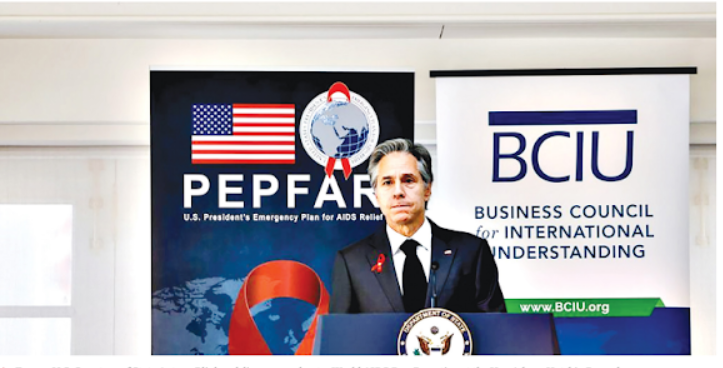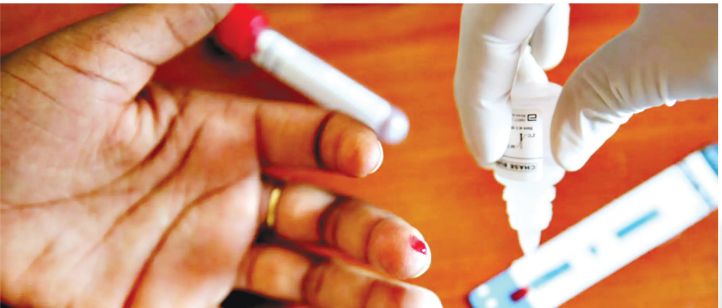
By Siphesihle Dlamini
The potential freeze on PEPFAR (President’s Emergency Plan for AIDS Relief) funding, which was an executive order issued by US President Donald Trump on January 20, 2025, could threaten years of hard-won progress in Eswatini’s fight against HIV and tuberculosis (TB).
US President Donald Trump signed an Executive Order that halts all United States foreign assistance for up to 90 days, pending a review of all programs. The only exceptions are emergency humanitarian assistance and military financing for Israel and Egypt.
The country’s Ministry of Health (MOH), led by Minister Mduduzi Matsebula, has raised the alarm over the devastating consequences that a halt in US Government funding would have on the nation’s health programs, particularly in HIV/AIDS and TB prevention, treatment, and care.
PEPFAR has long been a cornerstone of Eswatini’s efforts to combat the dual epidemics of HIV and TB.
With substantial financial and technical support, the program has empowered the Ministry of Health to expand access to HIV prevention, testing, treatment, and care services.
However, recent political developments in the United States have brought the future of this critical funding into question, raising concerns that the country could face dire setbacks in its health initiatives.
RELATED :Eswatini confronts GBV and socio-economic challenges in the fight against HIV/AIDS
Following this development, the Ministry of Health is assessing the impact of the PEPFAR funding pause on health programs in the Kingdom of Eswatini. In Eswatini, PEPFAR supports the Ministry of Health in HIV and TB response through the US Agency for International Development (USAID, US Department of Health and Human Services (HHS), US Center for Disease Control (CDC), US Department of Defence (DOD).
Through these agencies, PEPFAR implements various programmes through the MoH, and among the supported programme areas are HIV prevention, HIV testing, HIV treatment, health systems strengthening, capacity building, gender-based violence, cervical cancer screening, supply chain management and digitalization of data systems.
These programs target various population groups, including those classified as vulnerable to acquiring HIV infection. The support for HIV and TB programs by PEPFAR has seen Eswatini recognized internationally for achieving the 95-95-95 targets ahead of the 2030 deadline, a reduction in new HIV infections and a reduction in HIV-related deaths.
Although President Donald Trump’s announcement of a potential funding freeze did not specifically mention PEPFAR, the US government-funded initiative is fully encompassed within the scope of his decision.
For the people of Eswatini, particularly those living with HIV or at risk, this could mean the reversal of significant gains achieved over the last two decades.
Minister Of Health, Mduduzi Matsebula, has expressed grave concern over the potential ramifications of losing PEPFAR support. Speaking about the projected impact, he noted, “A halt in PEPFAR funding would not only disrupt our ability to maintain the progress we’ve made in reducing new infections but could also reverse the gains we have made in controlling HIV and TB.”
The minister further elaborated on the threat posed to key HIV and TB programs, warning that this funding cut could lead to a significant increase in new infections and deaths.
Matsebula outlined several specific areas where the effects would be most acutely felt. One of the major concerns is the potential slowdown of prevention programs such as pre-exposure prophylaxis (PrEP), post-exposure prophylaxis (PEP), and behaviour change communication.
These initiatives, which have been pivotal in reducing new infections, would be severely hindered, especially among vulnerable populations like adolescent girls and young women.
Without sustained support, Matsebula fears that the progress made in curbing HIV transmission could be undermined, leading to a spike in new infections.
“We are particularly concerned about the impact on key populations, including adolescent girls and young women.
If we are unable to continue our targeted interventions, there is a very real risk that new HIV infections will rise, which will eventually affect the general population,” he explained.
Another alarming consequence of a halt in PEPFAR funding is the potential disruption to HIV testing and counselling services. Minister Matsebula stressed that the number of counsellors available to provide testing services would decrease, and outreach programs targeting men and young people—critical to reaching those who are most at risk—would also be scaled back.
The reduction in the distribution of self-test kits, which have proven effective in reaching underserved communities, would further exacerbate the challenge.
The loss of funding would also negatively affect the quality of HIV treatment across the country.
According to Matsebula, an interruption in clinical mentorship and health worker training would hinder the ability to deliver optimized treatment regimens, decentralized service delivery models, and multi-month dispensing options that have been key in improving patient outcomes.
“The capacity to train and mentor health workers is an essential part of maintaining the high standards of HIV care that we have achieved so far,” Matsebula remarked. “Without it, we risk losing the gains we have made in ensuring that patients stay on treatment and viral suppression rates remain high.”
Perhaps one of the most pressing concerns raised by the Minister is the impact that a halt in funding would have on programs designed to address gender-based violence (GBV).

These programs, which have received vital support from PEPFAR, help reduce the vulnerability of women and girls to both HIV and GBV. Minister Matsebula warned that without this support, the risk of HIV transmission among these groups could increase, further exacerbating the country’s health challenges.
“The link between gender-based violence and HIV is well established, and many of our programs have been specifically designed to address this intersection.
Without PEPFAR, the most vulnerable members of our society—women, girls, and key populations—are at risk of being disproportionately affected,” he said.
PEPFAR’s funding also flows through several local and international organizations that work in close collaboration with the Ministry of Health. These include entities such as NERCHA, EGPAF, Georgetown University, PSI, and the Luke Commission, among others.
These organizations play a critical role in bridging gaps and alleviating the burden on the government’s healthcare system. However, with the suspension of PEPFAR funding, the Minister warned that these organizations would also face significant challenges in continuing their work.
“NGOs and other partners who play a crucial role in our national HIV and TB response will feel the impact. Their programs, which supplement and complement government efforts, could be severely curtailed,” he said.
The ripple effect of these cuts could have far-reaching consequences, including an overburdened healthcare system. A rise in HIV transmission rates and related illnesses would place additional strain on already stretched public health resources, leading to higher demand for services and a reduction in their quality.
The implications of a PEPFAR funding freeze would not be limited to the healthcare sector. Minister Matsebula also pointed to the potential economic and social consequences for vulnerable communities.
As funding for HIV programs decreases, the loss of jobs in the health sector, particularly among healthcare workers and counsellors, would contribute to rising unemployment rates. The economic impact on households already struggling with poverty could be devastating.
“We must consider the broader societal impact,” the Health Minister said. “The consequences of a funding freeze will not only affect people’s health but could also lead to significant economic hardship, particularly for women, youth, and those in key populations who are already marginalized.”
RELATED: Eswatini pledges E17.6 million for the fight against HIV/AIDS, Malaria
Considering the looming threat, Minister Matsebula has called on the international community, particularly the US government, to recognize the catastrophic effects that a freeze in PEPFAR funding would have on Eswatini’s fight against HIV and TB.
“The work we have done over the last two decades has saved countless lives,” Matsebula concluded. “We cannot afford to undo that progress. We must continue working together to protect the health and well-being of our people.”






